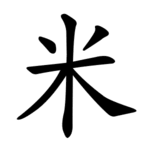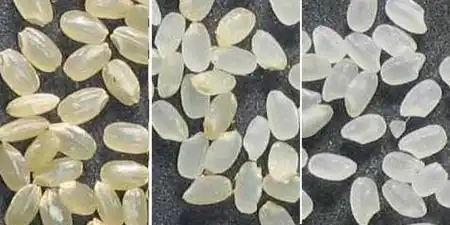Radical 119
Radical 119 or radical rice (米部) meaning "rice" is one of the 29 Kangxi radicals (214 radicals in total) composed of 6 strokes.
| 米 | ||
|---|---|---|
| ||
| 米 (U+7C73) "rice" | ||
| Pronunciations | ||
| Pinyin: | mǐ | |
| Bopomofo: | ㄇㄧˇ | |
| Gwoyeu Romatzyh: | mii | |
| Wade–Giles: | mi3 | |
| Cantonese Yale: | máih | |
| Jyutping: | mai5 | |
| Japanese Kana: | ベイ bei / マイ mai (on'yomi) こめ kome (kun'yomi) | |
| Sino-Korean: | 미 mi | |
| Names | ||
| Chinese name(s): | (Left) 米字旁 mǐzìpáng (Bottom) 米字底 mǐzìdǐ | |
| Japanese name(s): | 米/こめ kome (Left) 米偏/こめへん komehen | |
| Hangul: | 쌀 ssal | |
| Stroke order animation | ||
 | ||

In the Kangxi Dictionary, there are 318 characters (out of 49,030) to be found under this radical.
米 is also the 144th indexing component in the Table of Indexing Chinese Character Components predominantly adopted by Simplified Chinese dictionaries published in mainland China.
Evolution
 Oracle bone script character
Oracle bone script character Bronze script character
Bronze script character Large seal script character
Large seal script character Small seal script character
Small seal script character
Derived characters
| Strokes | Characters |
|---|---|
| +0 | 米 |
| +2 | 籴SC (=糴) 籵 (=蹯 -> 足) 籶 |
| +3 | 娄SC (=婁) 籷 籸 籹 籺 类SC (=類) 籼SC (=秈) 籽 籾 籿 粀 粁 粂 |
| +4 | 粃 (=秕 -> 禾 / 紕 -> 糸) 粄 粅 粆 粇 (=糠/粳) 粈 粉 粊 粋JP (=粹) 粌 粍 粎 粏 粐 粑 |
| +5 | 畨 (=翻 -> 羽 / 番 -> 田) 粒 粓 粔 粕 粖 粗 粘 粙 粚 粛JP (=肅 -> 聿) 粜SC (=糶) 粝SC (=糲) 粣 |
| +6 | 粞 粟 粠 粡 粢 粤SC/JP (=粵) 粥 粦 粧 (=妝 -> 女) 粨 粩 粪SC (=糞) 粫 粬 (=麴 -> 麥) 粭 |
| +7 | 粮SC (=糧) 粯 粰 粱 粲 粳 粴 粵 糀 |
| +8 | 粶 粷 粸 粹 粺 (=稗 -> 禾) 粻 粼 粽 精 粿 糁SC (=糝) |
| +9 | 糂 (=糝) 糃 糄 糅 糆 糇SC (=餱) 糈 糉 (=粽) 糊 糋 糌 糍 糎 |
| +10 | 糏 糐 糑 糒 糓 糔 糕 糖 糗 糘 |
| +11 | 糙 糚 糛 (=糖) 糜 糝 糞 糟 糠 糡 糢 糨 |
| +12 | 糣 糤 (=饊 -> 食) 糥 糦 糧 |
| +13 | 糩 糪 糫 糬 糭 (=粽) |
| +14 | 糮 糯 糰 |
| +15 | 糲 |
| +16 | 糱 糳 糴 |
| +17 | 糵 (=糱) |
| +19 | 糶 |
| +21 | 糷 |
Variant forms
This radical character has a different form in Taiwan Traditional Chinese to in other writing systems.
Traditionally, the two diagonal strokes under the horizontal start from the central junction, and the last stroke is a right-falling press when the character appears independently or a dot when used as a component. In Taiwan's Standard Form of National Characters, however, all four diagonal strokes are detached from other strokes, and the last stroke is a dot, whether used independently or as a component.
| Traditional | Taiwan |
|---|---|
| 米 粒 | 米 粒 |
Sinogram
The radical is also used as an independent Chinese character. It is one of the Kyōiku kanji or Kanji taught in elementary school in Japan.[1] It is a second grade kanji[1]
References
- "The Kyoiku Kanji (教育漢字) - Kanshudo". www.kanshudo.com. Archived from the original on March 24, 2022. Retrieved 2023-05-06.
Literature
- Fazzioli, Edoardo (1987). Chinese calligraphy : from pictograph to ideogram : the history of 214 essential Chinese/Japanese characters. calligraphy by Rebecca Hon Ko. New York: Abbeville Press. ISBN 0-89659-774-1.
- Lunde, Ken (Jan 5, 2009). "Appendix J: Japanese Character Sets" (PDF). CJKV Information Processing: Chinese, Japanese, Korean & Vietnamese Computing (Second ed.). Sebastopol, Calif.: O'Reilly Media. ISBN 978-0-596-51447-1.